|
 Secure Site
Secure Site
|
 |
Archive for August, 2012
 Peonies at Hyakken, #18 from the series 'Tōkyō Meisho Sanjurokkasen, Utagawa Shigenobu (1826 - 1869)
The bee emerging
from deep within the peony
departs reluctantly.
-Basho-
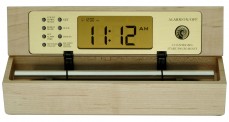 maple meditation timer and chime alarm clock called The Zen Alarm Clock, digital style in maple
Now & Zen’s Chime
Alarm Clock &
Meditation Timer Store
1638 Pearl St.
Boulder, CO 80302
Posted in Bamboo Chime Clocks, Japanese Inspired Zen Clocks, Japanese Poetry, Meditation Timers, Meditation Tools, mindfulness practice, Natural Awakening, Now & Zen Alarm Clocks, Progressive Awakening, Ukiyo-e, Well-being, Zen Timers
 B.P. Lathrop, title and date unknown, woodblock print Sleep patterns around the world have undergone a revolution over the past two centuries as the spread of artificial lighting profoundly changed the shape of human lives, first in cities and now even in many remote villages. Throughout most of history sundown brought an end to the activities in most homes, with people crawling into bed soon afterwards.
A. Roger Ekirch—author of a magisterial history of nighttime, At Day’s Close (Norton)— argues that the very nature of a night’s rest has changed since the Industrial Revolution. Sleep for our ancestors were often divided into two shifts of roughly four hours, with a period of wakefulness lasting an hour or longer in between.
A study conducted by the U.S. government’s National Institute of Mental Health appears to confirm Ekrich’s thesis. When people in an experiment were deprived of artificial light throughout the evening and night, they began to exhibit “a pattern of broken slumber—one practically identical to that of pre-industrial households,” Ekirch writes. Researchers in the study, noted hormonal changes in test subjects and “likened this period of wakefulness to something approaching an altered state of consciousness not unlike meditation.”
We still call midnight “the bewitching hour” because pagans in Europe practicing their old religion in defiance of Christian bans secretly performed rituals in this interval between rounds sleep. But Ekrich believes this period of nocturnal time-out-of-time played an important role in the psychic lives of almost everyone as an opportunity to reflect, pray, make love, think about your dreams— contemplative activities which were impossible to pursue during days of long, hard work. Night was the time for inner explorations of spirit and soul. “By turning night into day,” he writes, “modern technology has helped to obstruct our oldest path to the human psyche.”
While it may not be practical for many of us to reclaim the sleep patterns of pre-industrial peoples, we can easily incorporate some elements of this midnight reflection into our lives. Try turning off the lights early, and spending some time alone with our thoughts before going to sleep, or doing that in the morning rather than jumping right out of bed. And if you do experience trouble sleeping, think of the time awake as a gift of contemplation rather than the burden of insomnia.
 Wake up refreshed, love your alarm clock, transform your mornings with The Zen Alarm Clock's progressive awakening with gentle chimes. Boulder, Colorado—an innovative company has taken one of life’s most unpleasant experiences (being startled awake by your alarm clock early Monday morning), and transformed it into something to actually look forward to. “The Zen Alarm Clock,” uses soothing acoustic chimes that awaken users gently and gradually, making waking up a real pleasure. Rather than an artificial recorded sound played through a speaker, the Zen Clock features an alloy chime bar similar to a wind chime. When the clock’s alarm is triggered, its chime produces a long-resonating, beautiful acoustic tone reminiscent of a temple gong. Then, as the ring tone gradually fades away, the clock remains silent until it automatically strikes again three minutes later. The frequency of the chime strikes gradually increase over ten-minutes, eventually striking every five seconds, so they are guaranteed to wake up even the heaviest sleeper. This gentle, ten-minute “progressive awakening” leaves users feeling less groggy, and even helps with dream recall.
adapted from Ode, November 2005 by Jay Walljasper
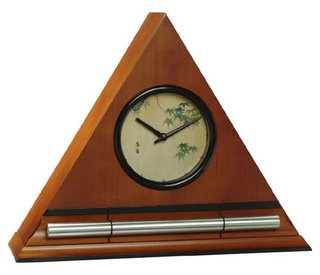 Zen Chime Clock with Japanese Maple Leaves in Honey Finish, a nighttime tool for insomniacs Now & Zen’s Alarm Clock Store
1638 Pearl Street
Boulder, CO 80302
Posted in Bamboo Chime Clocks, Chime Alarm Clocks, Japanese Inspired Zen Clocks, Natural Awakening, Now & Zen Alarm Clocks, Progressive Awakening, Sleep Habits
 Utagawa Kuniyoshi Before the electric lightbulb, people generally went to bed after dark and rose with the sun. If they stayed up after sundown, it was by the light of the fire, candle, or oil lamp—a low, warm light that eased their transition to sleep. But with the advent of electricity, light in our homes no longer matches what’s best for our bodies.
Most Americans now sleep an hour and a half less each night than they did a century ago, at great cost to health and safety, writes William Dement, M.D., Ph.D., of the Stanford University Sleep Research Center in The Promise of Sleep (Delacorte Press, 1999).
For the sake of productivity, people now treat sleep as a disposable commodity; fewer than 35 percent of American adults regularly get the seven to eight hours per night that researchers consider necessary. The irony is that burning the midnight oil actually lowers productivity by causing memory lapse, increased error rates, slower reflexes, lack of motivation, and short tempers.
When we sleep, our brains consolidate the day’s experiences into memory while our bodies re-energize our muscles and organs and regenerate cells. Researchers have identified several phases of brain-wave activity needed to experience the full benefits of slumber, yet it’s increasingly common for people to miss out on some of these stages.
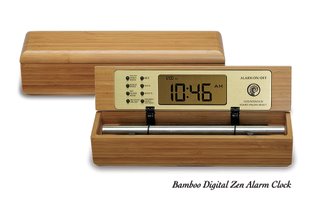 Bamboo Digital Chime Clock, a calming timer and alarm clock Researchers say we should pay attention to four primary factors in the sleeping environment:
- light
- noise
- temperature
- bed
Other factors can support your sleep haven. Soothing colors may relax your body and mind, putting you in the right mood for sleep; many people find lavender, blue, or light green appropriate. Minimizing electromagnetic fields near the bed is a good idea, too. The original Zen Alarm Clock in the triangle size only runs on batteries just for this reason. Finally, consider removing clutter, visual distractions, stimulating colors, bright lights, and television from the bedroom because their effects can stay with you even after the lights are out. Above all, pay attention to what works for you.
On the morning side of the equation, awakening gradually with the sun or the Zen Alarm Clocks gentle chime sequece is the healthiest way to go. In fact, one researcher points out that if your alarm clock should not startle you awake but waken you progressively and naturally. And think about what surrounds you when you first awaken. Feeling sensuous textures and seeing pleasant colors and objects in the morning light help start your day on a good note. Let yourself linger in bed for a while to ease the transition. One might consider purchasing a Zen Alarm Clock, the perfect alarm clock to awaken you gently and gradually with chimes instead of an electronic noise.
adapted from Natural Home, November 2003 by Carol Venolia
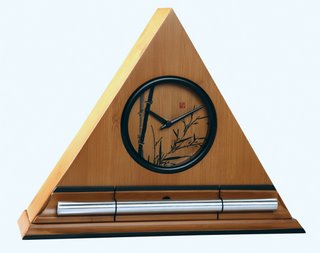 Zen Alarm Clock with Progressive Chime, set your clock as part of a relaxing bedtime routine Now & Zen’s Chime Alarm Clock Store
1638 Pearl Street
Boulder, CO 80302
(800) 779-6383
Posted in Bamboo Chime Clocks, Chime Alarm Clocks, Japanese Inspired Zen Clocks, Natural Awakening, Now & Zen Alarm Clocks, Progressive Awakening
 cherry blossoms, Now & Zen Inc. makers of Zen Timers Meditation has been defined as:
“self regulation of attention, in the service of self-inquiry, in the here and now.”
-Maison, Werheimer, & Kabat-Zinn (1999)
The various techniques of meditation can be classified according to their focus. Some focus on the field or background perception and experience, often referred to as “mindfulness”; others focus on a preselected specific object, and are called “concentrative” meditation.
In mindfulness meditation, the meditator sits comfortably and silently, centering attention by focusing awareness on an object or process (such as the breath; a sound, such as a mantra, koan or riddle-like question; a visualization; or an exercise).
wikipedia.org
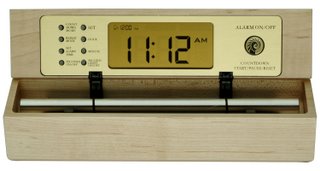 maple zen timer for meditation and yoga Now & Zen’s Meditation Timer Shop
1638 Pearl Street
Boulder, CO 80302
(800) 779-6383
Posted in Cherry Blossoms, Japanese Inspired Zen Clocks, Meditation Timers, Meditation Tools, Natural Awakening, Now & Zen Alarm Clocks, Progressive Awakening, Well-being, Yoga Timer, Yoga Timers by Now & Zen, Zen Timers
 Gentle Chime Alarm Clocks with Gradual Chime Sequence Feature: Wakes you gradually and gently over 10 minutes with a Tibetan bell-like chime.
Benefit: A beautiful way to wake up at home or traveling.
Feature: A countdown timer perfect for meditation, yoga, or to end meetings on time.
Benefit: Makes yoga, mediation and meetings more relaxing and fun.
Feature: Chimes on the hour, lighted dial, AC or battery powered, beautiful yet portable.
Benefit: A timepiece for a progressive lifestyle.
Feature: Hardwood case, acoustic chime.
Benefit: Aesthetic pleasure.
Feature: An interval timer that will chime repeatedly at any set sequence.
Benefit: Sets the pace of practice with a beautiful sounding chime.
 Chime Alarm Clock Store - Boulder, CO (800) 779-6383 Now & Zen’s Chime Alarm Clock Shop
1638 Pearl Street
Boulder, CO 80302
(800) 779-6383
Posted in Bamboo Chime Clocks, Natural Awakening, Now & Zen Alarm Clocks, Progressive Awakening
 Dream, Pablo Picasso Birds do it. Cats do it. And Spaniards most especially do it—every day, in broad daylight.
They nap. Proudly, without a hint of embarrassment. Grown adults—executives, teachers, civil servants—wink off in the middle of the workday like kindergartners at mat time. From 1 or 2 o’clock to 4:30 or so every afternoon, Spain stops the world for a stroll home, a leisurely meal, a few z’s. Common Market technocrats have informed the Spanish that this is not the way things will get done in the oft-threatened unified Europe. The Spanish reply with a flourish of rioja and snooze alarms. ¡Viva siesta!
At a time when productivity is the world’s largest religion, the siesta tradition lives on. In Spain, work operates under the command of life, instead of the other way around. No task is so critical that it can’t wait a couple of hours while you attend to more important matters like eating, relaxing, or catching up on sleep from a night on the town. When the midday break hits, offices empty and streets clear as if by the hand of Rod Serling. Befuddled foreigners left behind quickly learn that they have entered a new circadian order.
Taking a long break in the middle of the day is not only healthier than the conventional lunch; it’s apparently more natural. Sleep researchers have found that the Spanish biorhythm may be tuned more closely to our biological clocks. Studies suggest that humans are “biphasic” creatures, requiring days broken up by two periods of sleep instead of one up-till-you-drop “monophasic” shift. The drowsiness you feel after lunch comes not from the food but from the time of day. “All animals, including humans, have a biological rhythm,” explains Claudio Stampi, director of the Chrono Biology Research Institute in Newton, Massachusetts. “One is a 24-hour rhythm—we get tired by the end of the day and go to sleep—and there is a secondary peak of sleepiness and a decrease in alertness in the early afternoon. Some people have difficulty remaining awake, doing any sort of task between one and four in the afternoon. For others it’s less difficult, but it’s there. So there is a biological reason for siestas.”
 Digital Zen Alarm Clocks, available in maple, walnut, bamboo, and black lacquer Unlike the average lunch break, the siesta is a true break in the action because there is no choice but to come to a full and complete stop. You can’t do errands; the shops are closed. You can’t make business calls; nobody’s at the office. Most people go home for lunch, or get together with family or friends for a glass of vino, and nod out afterwards.
Like a lot of us in the land of time scarcity, I find it harder and harder to shut it off, to switch off work mode and be social—that is, be unproductive, and just be. The divide is blurred by a volatile economy of all-consuming competition that has turned off-hours into off-site catch-up. Blink and it’s Monday again. The culprit, says David Scott, an associate professor of recreation, park, and tourism sciences at Texas A&M, is the accelerating cult of efficiency.
“We are an efficiency-oriented society,” he says. “It is perhaps the dominant value in this culture. The faster things get done, the better off we’re going to be. The idea of efficiency at all costs seems to be all-pervasive. It tends to invade our leisure. Unfortunately, socializing doesn’t have a ‘yield.’ It’s hard to develop relationships; those things take time.”
The siesta lifestyle is rooted in a culture with values that are anathema to the ascendant economic order, so don’t expect the rest of Europe to adopt Spanish hours. A few Spanish firms have begun shortening their siesta time as the eurodollar era approaches. But maybe, being the great taskmasters we are, we could find a way to put one quality-of-life item on the agenda each day. We could even give it a productive rationale: Life expectancy in Spain is two years longer than in the United States. Think of all that extra output.
Our Digital Zen Clock’s long-resonating Tibetan bell-like chime makes waking up a beautiful experience – its progressive chimes begin your day with grace. When the clock’s alarm is triggered, the acoustic chime bar is struck just once … 3-1/2 minutes later it strikes again … chime strikes become more frequent over 10 minutes … eventually striking every 5 seconds until shut off. As they become more frequent, the gentle chimes will always wake you up – your body really doesn’t need to be awakened harshly, with a Zen Clock you’re awakened more gradually and thus more naturally.
What makes this gentle awakening experience so exquisite is the sound of the natural acoustic chime, which has been tuned to produce the same tones as the tuning forks used by musical therapists. According to the product’s inventor, Steve McIntosh, “once you experience this way of being gradually awakened with beautiful acoustic tones, no other alarm clock will ever do.”
adapted from Escape Mazaine, July 1998
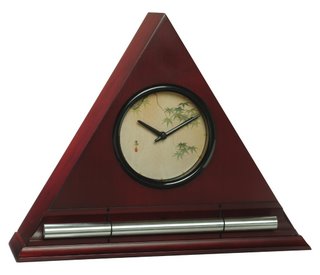 Japanese Leaves Dial Face in Burgundy Finish by Now & Zen Now & Zen – The Peaceful Chime Alarm Clock Store
1638 Pearl Street
Boulder, CO 80302
(800) 779-6383
Posted in Chime Alarm Clocks, Japanese Inspired Zen Clocks, mindfulness practice, Natural Awakening, Now & Zen Alarm Clocks, Progressive Awakening, Sleep Habits, Well-being
 rest and relaxation You know a little too well what your kitchen looks like at 3 a.m. You’ve memorized the light patterns on your bedroom ceiling, counted thousands of sheep, and watched your Zen Alarm Clock for countless hours. And you’ve come to expect the thump of the newspaper at the front door a few minutes after 5.
If this sounds familiar, you’re in good company: Sixty-seven percent of American women surveyed in last year’s National Sleep Foundation poll said they regularly have trouble sleeping. Many of the culprits are hallmarks of our current culture: long work hours, stress, sugar-laden cappuccinos, wanting to fit too much into one day. Several recent reports, including a study published in Social Science & Medicine titled “Is Sleep Really for Sissies?,” have suggested that we value what we do during the day much more than what goes on at night.
But good sleep isn’t something we can afford to take off our to-do list. Like a nutritious diet and exercise, sleep is a foundation for health — not to mention sanity.
“It’s a bedrock,” says Paul Glovinsky, Ph.D., coauthor of “The Insomnia Answer.” As anyone with sleep trouble knows, a single bad night can hamper productivity, memory, even basic conversation skills. But it’s over time that insomnia really takes its toll. “We’ve seen that, in all kinds of ways, deficits accrue when you don’t sleep.”
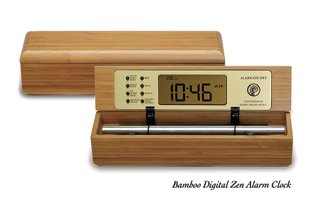 Bamboo Digital Chime Clock, for a progressive awakening Poor sleep may set you up for heart problems, for instance, plus lowered immunity, depression, diabetes, obesity, and chronic pain. One study actually proved that sleep deprivation can damage our mood in a very real way: Compared with those of rested people, the emotional centers of the brain in sleep-deprived people were 60 percent more reactive to negative experiences.
So what’s a droopy-eyed, overcaffeinated, dream-deficient woman to do? Committing to good sleep hygiene is a start. But it also pays to identify your unique sleep profile. There’s no single insomnia pattern; there are many. And delving into the details of yours can help you overcome it.
We went to several sleep experts with some common sleep types, like the person who can’t stop thinking, the one who wakes up at odd times, and the one who keeps finding excuses to push off bedtime (Really? Another episode of “House Hunters?”).
As it turns out, these patterns often have distinct causes and solutions. Don’t be surprised if more than one profile rings true; your patterns may fluctuate. The key is to give some serious thought to your sleep life. Use The Zen Timepiece with the Bowl /Gong to waken you. Try turing it around so that the digital display doesn’t show. The quality of your waking life — not to mention your health — depends on it.
Boulder, Colorado—an innovative company has taken one of life’s most unpleasant experiences (being startled awake by your alarm clock early Monday morning), and transformed it into something to actually look forward to. “The Zen Alarm Clock,” uses soothing acoustic chimes that awaken users gently and gradually, making waking up a real pleasure.
The luxurious awakening provided by the Zen Alarm Clock is part of the growing preference for things natural—natural foods, natural fibers, and now, natural acoustic sounds. Like organic tomatoes in your salad, the organic sounds of the Zen Alarm Clock’s sweet acoustic chimes are truly a gourmet experience.
What makes this gentle awakening experience so exquisite is the sound of the natural acoustic chime, which has been tuned to produce the same tones as the tuning forks used by musical therapists. According to the product’s inventor, Steve McIntosh, “once you experience this way of being gradually awakened with beautiful acoustic tones, no other alarm clock will ever do.”
Adapted from Body + Soul Magazine, May 2008 by Sarah Schmelling
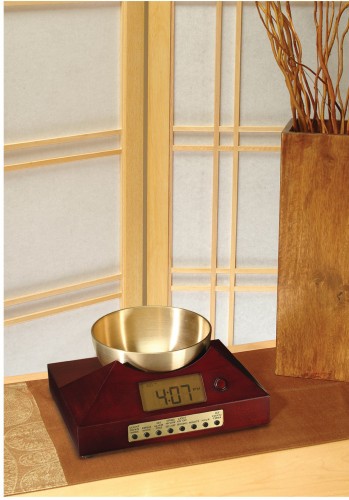 Zen Alarm Clock for a Gentle Awakening with a Bowl Gong and Mindfulness Timer Now & Zen’s Alarm Clock Shop
1638 Pearl Street
Boulder, CO 80302
(800) 779-6383
Posted in Bamboo Chime Clocks, Chime Alarm Clocks, Japanese Inspired Zen Clocks, Natural Awakening, Now & Zen Alarm Clocks, Progressive Awakening, Sleep Habits, Ukiyo-e, wabi-sabi, Well-being, Zen Timepiece by Now & Zen, Zen Timers
 Keishu, New Year Music, unknown date It’s amazing nobody thought of this before: Researchers in Taiwan have discovered that listening to 45 minutes of calming music at bedtime helps elderly people fall asleep faster, sleep better and longer, and feel less tired the next day.
Half of the 60 participants in the study listened to music of their choice for 45 minutes each night for three weeks. The other half, who only kept a journal about their sleep, reported no improvement in their slumbers.
The researchers suspect music relaxes the body and decreases a key stress hormone. However it works, it’s risk free.
Our Zen Clock serves as a countdown and interval timer for yoga, meditation, bodywork, etc.; and it can also be set to chime on the hour as a tool for “mindfulness.”
When the clock’s alarm is triggered, the acoustic chime bar is struck just once … 3-1/2 minutes later it strikes again … chime strikes become more frequent over 10 minutes … eventually striking every 5 seconds until shut off.
adapted from Natural Solutions Magazine, April 2005
 Bamboo Digital Chime Clock, for a progressive awakening Now & Zen’s Chime Alarm Clock Store
1638 Pearl Street
Boulder, CO 80302
(800) 779-6383
Posted in Chime Alarm Clocks
 Toyohara, Kunichika, 1835-1900 Saruwaka-cho Kogiku Too frazzled to focus at work? Meditation may help hone your attention — even if you’re new to the practice. In a University of Pennsylvania study, a group of 17 beginners showed great improvements in focus after meditating for a half-hour, five times a week for eight weeks. Regular meditation also enhanced their ability to manage tasks and stay alert while working.
To ease into a practice, find a quiet place every day, set your Zen Meditation Timer and simply focus on following your breath. “Even if you’re doing five minutes, three times a day, it can help a lot in getting your body accustomed to slowing down,” says Vandita Kate Marchesiello, director of the Kripalu Yoga Teachers Association. For more guidance, she recommends picking up a meditation book, CD, or DVD, or attending a local class.
Our Mindfulness Clock & Timer, called The Zen Clock serves as a countdown and interval timer for yoga, meditation, bodywork, etc.; and it can also be set to chime on the hour as a tool for “mindfulness.”
adapted from Body + Soul, October 2007
 Black Lacquer Zen Alarm Clock and Meditation Timer
Now & Zen’s Mindfulness Clocks and Timer Store
1638 Pearl Street
Boulder, CO 80302
(800) 779-6383
Posted in Bamboo Chime Clocks, Chime Alarm Clocks, intention, Meditation Timers, Meditation Tools, mindfulness practice, Now & Zen Alarm Clocks, Ukiyo-e, Well-being
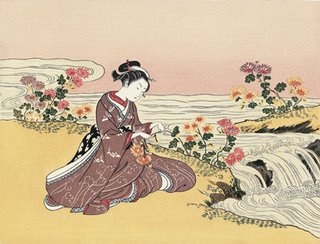 Harunobu Suzuki, A Girl Collecting Chrysanthemum Dew by the Stream Meditation is often credited with helping people feel more focused and energetic, but are the benefits measurable?
A new study suggests that they are. When researchers tested the alertness of volunteers, they found that the practice proved more effective than naps, exercise or caffeine. The results were presented at a recent conference of the Society for Neuroscience.
The researchers, led by Prashant Kaul of the University of Kentucky, took 12 students who did not meditate and taught them the basics in two short sessions.
Then, over a series of weeks, the students were asked to come in and take a test devised to measure skills like reaction time. The tests involved a series of visual cues on a display screen that the volunteers had to react to by pushing the correct button.
The students were asked to take the tests in mid- to late afternoon, when people tend to be sleepiest. They did so before and after 40 minutes of meditating, napping or exercising, or after taking caffeine. Napping produced poor results, presumably because of “sleep inertia,” the researchers said.
Caffeine helped, and exercise was unpredictable.
Earlier studies have found that people are awake while meditating but that their brains undergo changes similar to patterns found in sleep. Some studies have found that people who meditate a lot report sleeping less, so the researchers were curious to see if meditation could serve the same function as sleep. The results support the idea that it can.
In fact, when some of the students were asked to skip a night’s sleep and then take the test, the researchers said, meditation was even more helpful.
Although meditation can be done in almost any context, practitioners usually employ a quiet, tranquil space, a meditation cushion or bench, and some kind of timing device to time the meditation session. Ideally, the more these accoutrements can be integrated the better. Thus, it is conducive to a satisfying meditation practice to have a timer or clock that is tranquil and beautiful. Using a kitchen timer or beeper watch is less than ideal. And it was with these considerations in mind that we designed our digital Zen Alarm Clock and practice timer. This unique “Zen Clock” features a long-resonating acoustic chime that brings the meditation session to a gradual close, preserving the environment of stillness while also acting as an effective time signal.
adapted from The New York Times, October 2006 by Eric Nagourney
 Digital Zen Alarm Clocks, meditation timers and alarm clocks with chimes Now & Zen’s Meditation Timer Store
1638 Pearl Street
Boulder, CO 80302
Posted in Chime Alarm Clocks, Japanese Inspired Zen Clocks, Meditation Timers, Meditation Tools, Natural Awakening, Now & Zen Alarm Clocks, Progressive Awakening, Sleep Habits, Well-being
« Previous Entries
Next Page »
|
|
|
|